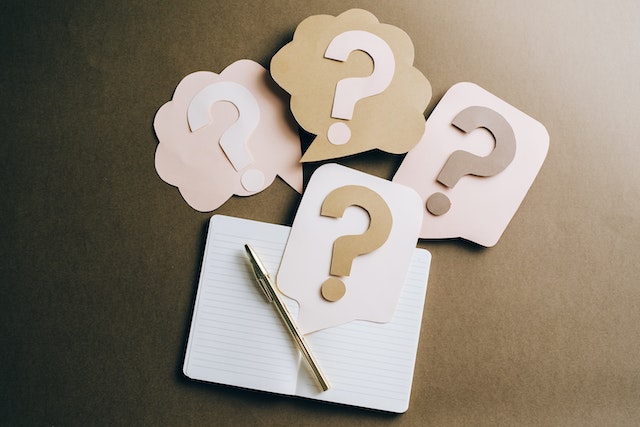Written by: Milica Bokšan
“Are Serbian and Croatian the same language or two different languages” is the biggest dilemma in our area. And the answer to this question is: It depends on who you ask. 🙂
That does not mean that if you ask a Croat he will tell you that they are not, and if you ask a Serb he will tell you that they are, or vice versa.
The answer will depend on the individual and their opinion regardless of the country they live in.
What Does History Say About Serbian vs Croatian
We can also call this paragraph a small lesson from great history because the historical aspect is necessary to better explain the differences between Serbian and Croatian languages.
Yugoslavia was a country in the Balkans that existed until 1992.
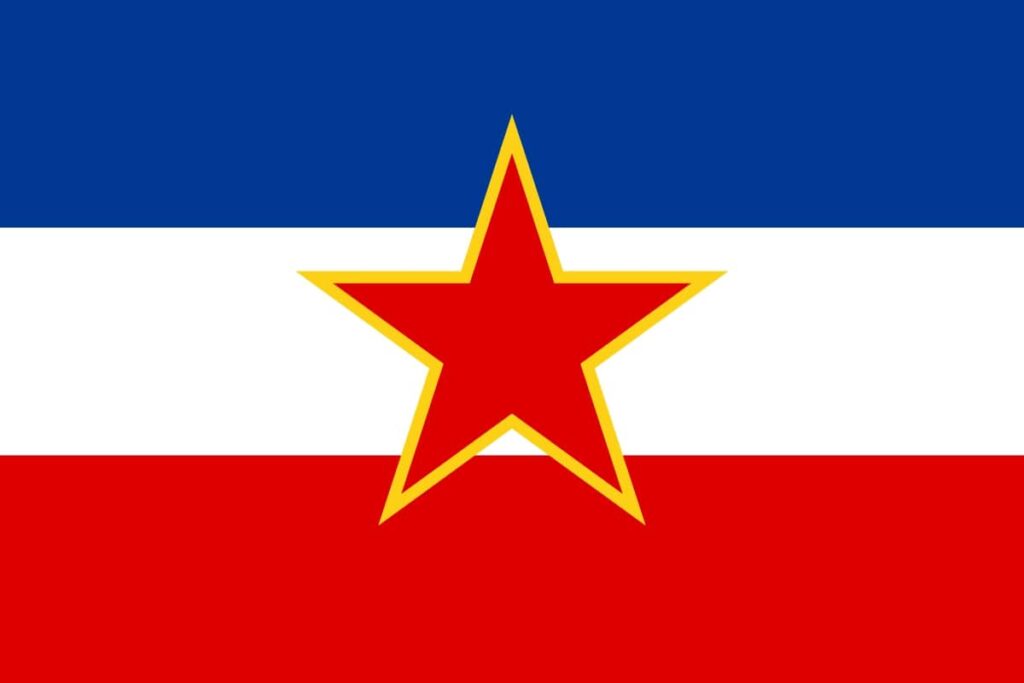
It consisted of 6 republics (Serbia, Montenegro, Croatia, Macedonia, Slovenia and Bosnia and Herzegovina) and 2 autonomous provinces (Kosovo and Metohija and Vojvodina).
During a large period of the 20th century, the Serbo-Croatian language was spoken throughout the territory of Yugoslavia. It was the official language in Serbia, Croatia, Bosnia and Herzegovina and Montenegro.
In 2000, the Serbo-Croatian language was divided into Serbian, Croatian, Bosniak and Montenegrin languages.
Although not everyone would agree that they are separate languages, but variants of the same language, certain differences between them do exist.
In this article, we will focus on the differences between the Serbian and Croatian languages.
#1 Serbian Vs Croatian: The Pronunciation of Yat’s Voice
The voice Yat (Ѣ) is an old voice from the Slavic languages that has been replaced by groups of letters. (It sounds more complicated than it is, but stick with just a few more complicated sentences and it will soon become clear.)
According to which group of letters the Yat sound was replaced, three pronunciations were created.
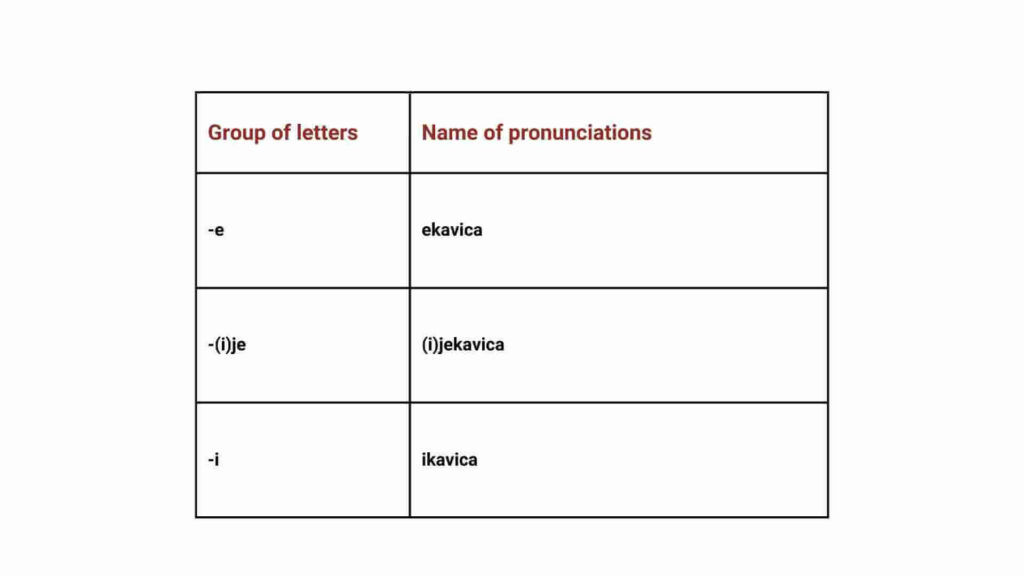
In Serbia, we use ekavica, while Croats use (i)jekavica and in some parts ikavica.
*In some areas of Serbia, especially rural ones, (i)jekavica is also used.
Let’s look at this through examples of the pronunciation of the word “milk”:
Serbian – ekavica – mlEko
Croatian – (i)jekavica – mlIJEko
Or, for example, the word “child”:
Serbian – ekavica – dEte
Croatian – (i)jekavica – dIJEte
You may notice that the words differ by only a few letters.
#2 Serbian Vs Croatian: Shtokavian Dialect
At the base of both the Serbian and Croatian languages is Štokavsko narečje (= the Shtokavian dialect).
It got its name from the interrogative pronoun Šta or Što (= What).
If you want to ask someone in Serbia what he is doing right now, you will ask him:
– Šta radiš? (= What are you doing?)
For example, you can get the following answer:
– Gledam TV. (= I am watching TV.)
But, if you are in Croatia and want to ask someone what he is doing, you will ask him:
– Što radiš? (= What are you doing?) and you will get the same answer.
So what’s the difference then?
The difference is in the last letter of the interrogative pronoun Šta, so if you ask in Serbia:
– Što gledaš? (In Serbia this means = Why are you watching that?)
You will get the answer:
– Zato što mi počinje serija. (= Because my TV show starts now.)
Because in Croatian, Što means What, and in Serbian, Što means Why. 🙂
If you want to learn more about this difference you can check out our article about the words Šta and Što.
#3 Serbian Vs Croatian: Using Infinitive
The Infinitive is the basic form of the verb, and it is used differently in Serbian and Croatian languages.
Let’s see how.
In Serbian, the Infinitive is rarely used in everyday communication, while in Croatia it is used regularly.
For example:
Serbian – Idem da spavam. (= I’m going to sleep.)
Croatian – Idem spavati. (= I’m going to sleep.)

Or:
Serbian – Mislio sam da počnem da čitam tu knjigu ponovo. (= I thought I would start reading that book again.)
Croatian – Mislio sam da počnem čitati tu knjigu ponovo. (= I was thinking of starting to read that book again.)
But don’t worry, both Serbs and Croats will understand what you want to say regardless of which grammatical construction you decide to use.
#4 Serbian Vs Croatian: Verb Suffixes
In the Serbian language, prefixes are most often used for ending verbs:
– OVATI
– ISATI
In the Croatian language, the prefix – IRATI is most often used instead of those two.
Serbian – kombinovati (= to combine)
Croatian – kombinirati (= to combine)
Serbian – kontrolisati (= to control)
Croatian – kontrolirati (= to control)
If you’ve thought so far: “I’m not going to think about Are Serbian and Croatian languages similar, I’m just even more confused” – Stay with us, a couple of more obvious differences with zero grammar rules are coming!
#5 Serbian Vs Croatian: Intonation
In both countries there is a vast array of regional dialects, and, depending on the area you are in, you will find people using different words for the same thing or having a different accent.
Some say that the Croatian language sounds a little bit softer than Serbian, but it is ungrateful to have others describe it to you.
You will see the difference best when you listen to them for yourself, so you will be able to draw your conclusion: Are Serbian and Croatian the same language?
For this research, we suggest that you first listen to Serbian and Croatian music artists one after the other. And then, when you get an impression, you can also watch an old film from the area of the former Yugoslavia. We suggest you start with comedies.
#6 Serbian Vs Croatian: The Letter
Until 1992, in Croatia, as well as in Serbia, schools taught both Cyrillic and Latin alphabets.
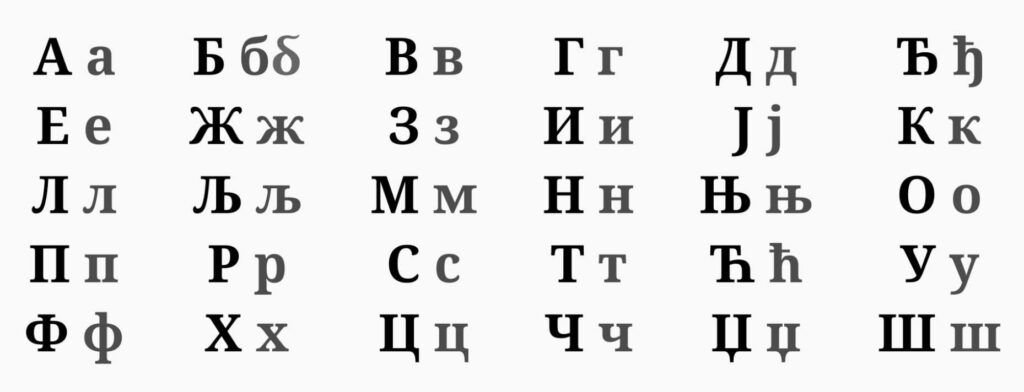
Since 1992, learning and writing in Croatia has been almost exclusively in Latin. In Serbia, both scripts are still valid and official, that is, they are equally taught in schools and used even today.
#7 Serbian Vs Croatian: Vocabulary
For the very end, we left the part that will probably be the most interesting for you.
Although almost all the same words are used in Serbian and Croatian, some have their counterparts that are completely different when it comes to both writing and sounding.
Here are some examples:
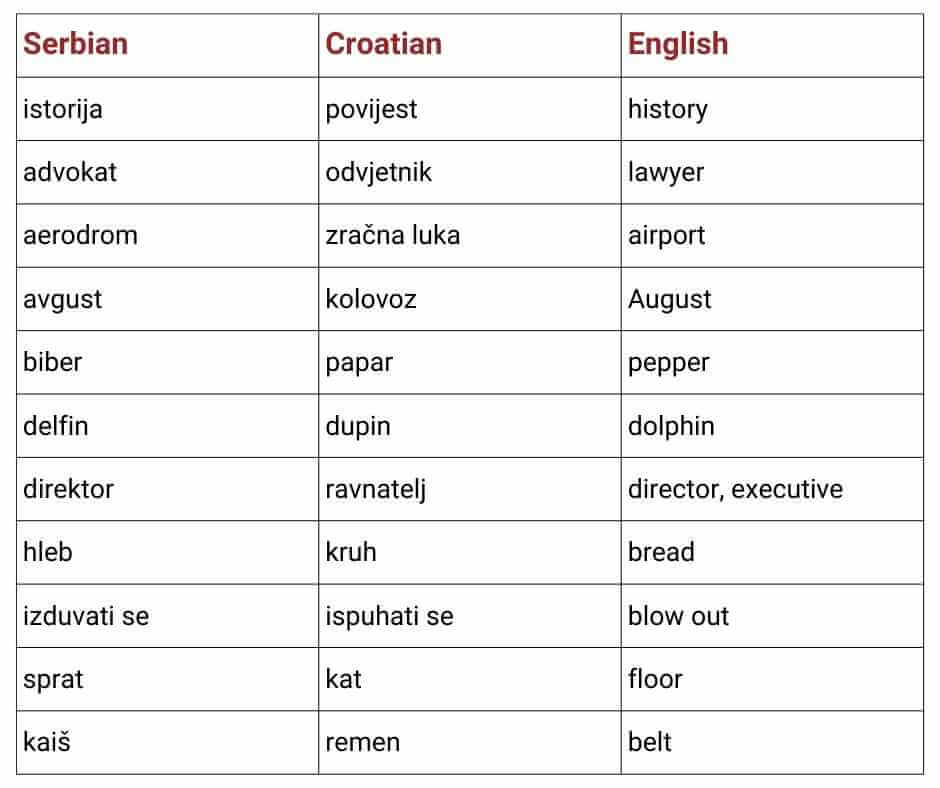
However, regardless of how different they are, most often both Serbs and Croats will know what you are talking about, whichever word you choose to use. Many of these words are often used as synonyms.
Should you learn Serbian or Croatian?
It really depends why you want to learn Serbian or Croatian. If you have a partner or a friend who is a Bosnian Serb, a Serb from Serbia or Montenegrin, Serbian is probably the better option. Even though Montenegrin and Serbian have some differences, they are closer to each other than to Croatian.
However, if you have a partner from Croatia and a Bosnian Croat, probably Croatian is a better option. Nonetheless, if you learn Serbian and speak with Croats or vice versa, everyone will understand you. So, pick the language that sounds better for you and why you want to learn it.
To Sum Up
Serbian and Croatian are not identical in every aspect, but whether these differences are at the level of dialect or the entire language is a complicated question which involves history, culture and politics.
And since our goal here is not to complicate, but to deal with the beauty of the language, know that if you learn Serbian language, you will be able to perfectly understand Croatian, Bosnian, Montenegrin, and a large part of the Macedonian language as well!

